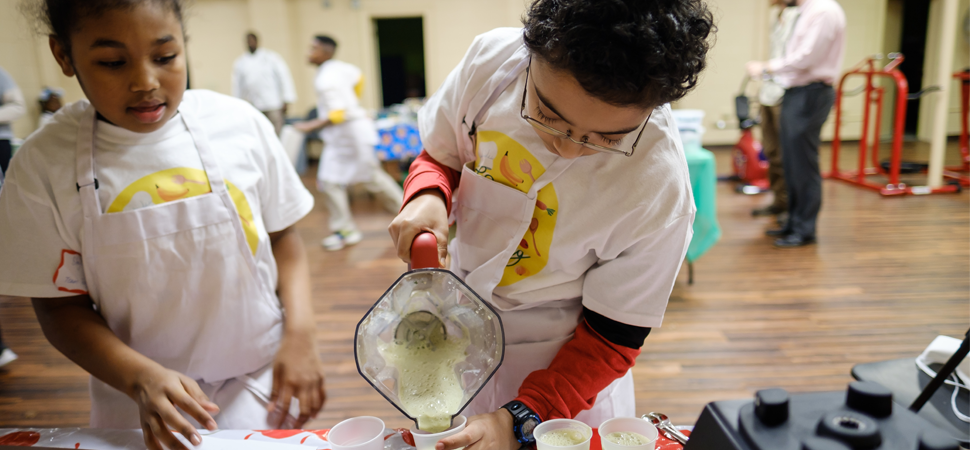A Recipe for Success: Kids’ Cooking Coalition Goes Virtual
Despite a year like no other, the Kids’ Cooking Coalition (KCC) is back. Together, organizers reimagined the delivery of its curriculum to fit into the virtual landscape that has occupied the lives of so many over the past year. The transition to a virtual program has allowed the KCC to interact with children and families like never before, despite the challenges introduced by the COVID-19 pandemic.
Started by Margaret Savoca, Ph.D. – a nutrition researcher and long-time community volunteer – the Kids’ Cooking Coalition was launched in the spring of 2018 under the umbrella of the Campus Kitchen at Wake Forest University. Since then, it has grown to include both partnering organizations and individuals that help fulfill its mission to establish healthy cooking and eating habits in Winston-Salem/Forsyth County elementary school students.
While many organizations have had to cut back on their services, or even temporarily shut down due to the pandemic, Kids’ Cooking Coalition has been able to rise to the occasion with its virtual lesson plan.
“Our goal is to introduce children to these cooking skills that they will – at one point in their lives – rely on either as a necessity or for enjoyment,” explained Savoca. “Because of our virtual format this year, we are not only introducing more children to those skills, but reaching parts of the community that we probably wouldn’t have reached with our traditional, in-person curriculum.”
In previous years, KCC would meet with elementary-aged children from after-school programs throughout the city, including Cook Literacy Model School, the YWCA Best Choice Center and the Polo Park Recreation Center. With the help of Wake Forest student volunteers, children had the chance to learn about nutrition while practicing their cooking skills over a six-week period.
“This year was an opportunity to reflect on our purpose and the importance of the work being done around us, but also reconceptualize what this program could be,” said Sydney King, the AmeriCorps*VISTA and Winston-Salem Community Action Coalition member placed with Kids’ Cooking Coalition for the 2020-21 year.
“At the end of the day, no matter how we’re delivering our curriculum, our purpose is really about getting kids interested in and excited about cooking,” continued King. “We talk about nutrition and learn practical skills, and those are both extremely important, but it’s really about getting excited. That interest and excitement is the spark that will change their relationship with food.”
This spring, it’s an exciting family affair. For four weeks, 18 families will join in a virtual cooking lesson provided by local chefs Josh McGee (Y’all Company), Terrell Anistead, Shanta Faison (Twin City Catering Co.), and N’Gai Dickerson (Homegrown Heroes).
Each class will give children the unique opportunity to put on their chef’s hat, while supervising family members fulfill the role of sous chef throughout the meal-making process.
The month-long curriculum begins with a chicken and broccoli stir fry from McGee, followed by shrimp and grits from Anistead, spaghetti squash with turkey and a tomato sauce courtesy of Faison, and will conclude with an Ethiopian stew taught by Dickerson. In addition to practicing healthy eating and gaining food preparation skills, children and their families will be introduced to exciting cuisines and ingredients.
Despite classes taking place through a computer screen, with the guest chef filming from the Enterprise Center and children located safely in their home kitchens throughout Winston-Salem, Wake Forest students remain heavily involved and are essential to the program’s success. Each week, they gather the necessary ingredients for the lesson from local grocery stores, package them at the Campus Kitchen and deliver the boxes directly to the families.
In addition, they assist with production on the day of the lesson. With 18 families participating in the program, KCC still incorporates one-on-one attention with its participants. Student volunteers lead small break out rooms throughout each class teaching prep work, knife skills when cutting vegetables and more.
“Outside of everything that has been mentioned, having the children interact with college students is at the heart of this program as well,” said King. “There is a mentorship aspect to the KCC – throughout every lesson, children can see how people of any age can be healthy and creative all while spending time with others and learning a life-long skill, even if it’s happening virtually.”
Written by: Miranda Wells (WFU ’22)

